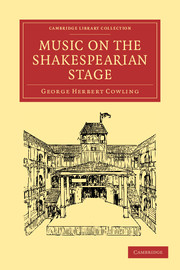Book contents
- Frontmatter
- PREFACE
- Contents
- LIST OF ILLUSTRATIONS
- Introduction
- CHAP. I Music in pre-Shakespearian drama
- CHAP. II An Elizabethan Stage and its music
- CHAP. III Musical instruments and their uses
- CHAP. IV Incidental music
- CHAP. V Musicians, Singers and Songs
- CHAP. VI Elizabethan music, and its share in the drama
- CHAP. VII Some literary allusions to music in Elizabethan plays
- Bibliography
- Appendix
- Index
CHAP. VII - Some literary allusions to music in Elizabethan plays
Published online by Cambridge University Press: 07 September 2010
- Frontmatter
- PREFACE
- Contents
- LIST OF ILLUSTRATIONS
- Introduction
- CHAP. I Music in pre-Shakespearian drama
- CHAP. II An Elizabethan Stage and its music
- CHAP. III Musical instruments and their uses
- CHAP. IV Incidental music
- CHAP. V Musicians, Singers and Songs
- CHAP. VI Elizabethan music, and its share in the drama
- CHAP. VII Some literary allusions to music in Elizabethan plays
- Bibliography
- Appendix
- Index
Summary
There are many allusions to instruments of music in our elder poets, and an interesting list might be compiled showing the uses of the various sorts. But not until the Elizabethan age did music provide materials for poetic imagery. The medieval poets in mentioning music piled instrument on instrument. Thus in The Squyr of Lowe Degre—
“There was myrth and melody
With harpe, getron, and sautry,
With rote, ribible and clokarde,
With pypes, organs and bumbarde,
With fydle, recorde and dowcemere,
With trumpette and with claryon clere.”
And so in Piers Plowman, the poet is not content with saying he cannot play music, he must emphasise the fact by cataloguing the accomplishments of a wandering minstrel
“Ich can not tabre, ne trompe, ne telle faire gestes,
Ne fithelyn at festes, ne harpen,
Japen, ne jagelyn, ne gentillische pipe,
Nother sailen, ne sautrien, ne singe with the giterne.”
We can easily imagine how one of our early poets would have interpreted the following thought from Marlowe's Tamburlaine (Act II. Sc. 4):
“The cherubins and holy seraphins
That sing and play before the king of kings
Use all their voices and their instruments
To entertain divine Zenocrate.”
- Type
- Chapter
- Information
- Music on the Shakespearian Stage , pp. 99 - 109Publisher: Cambridge University PressPrint publication year: 2009First published in: 1913

